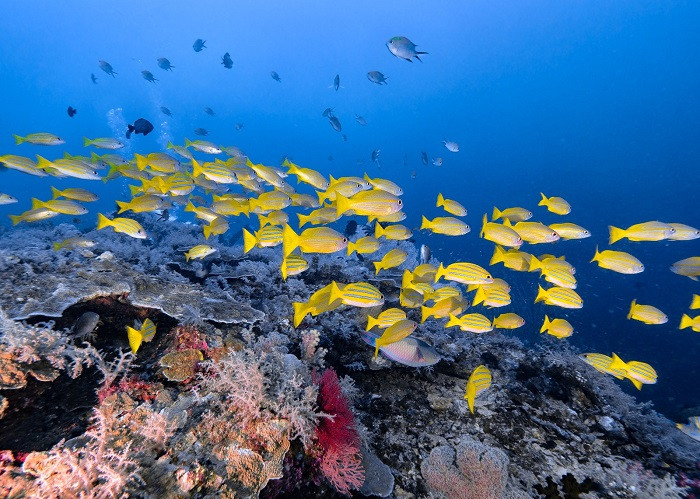Popular Reads
Top Results
Can't find what you're looking for?
View all search resultsPopular Reads
Top Results
Can't find what you're looking for?
View all search resultsTransforming global ocean commitments into on-the-ground action
Harmful fishing methods, pollution, biodiversity loss and habitat degradation are just a few of the ways that human activities are seriously endangering our marine environment.
Change text size
Gift Premium Articles
to Anyone

June 8 is World Ocean Day. It is once again that time of year when we celebrate the ocean, the planet’s life support system that regulates our climate, provides oxygen, food and livelihoods to billions, and connects us across continents.
The next day, we mark Coral Triangle Day, shining the spotlight on the epicenter of marine biodiversity, which is home to 76 percent of the world’s coral species, 37 percent of the world’s reef fish species, and supports millions of people with their food and livelihoods.
The Coral Triangle gathers Indonesia, Malaysia, the Philippines, Papua New Guinea, Solomon Islands and Timor-Leste.
Despite the extent to which humanity depends on the ocean and marine biodiversity, we must recognize that our oceans' abundance of environmental services is finite. This underlines the urgent need to address the threats facing our seas. Harmful fishing methods, pollution, biodiversity loss and habitat degradation are just a few of the ways that human activities are seriously endangering our marine environment.
This year’s World Oceans Day theme Planet Ocean: The Tides are Changing aims to highlight the importance of ocean health to our planet’s survival, galvanize global support for ocean issues, and generate increased investment towards its management and sustainability.
This call comes after a series of inspiring global agreements and commitments for ocean protection. In November last year, under the Indonesian presidency, the Group of 20 paid special attention to the oceans’ role in addressing climate change and sustainable blue economies.
In December 2022, more than 195 nations agreed to protect a third of the planet for nature by 2030. Called the Kunming-Montreal Global Biodiversity Framework agreement, the deal is a landmark global pact aimed at safeguarding the earth’s biodiversity both at land and sea.
In March of this year, United Nations delegates reached a historic agreement on protecting marine biodiversity in international waters after nearly two decades of talks.
In Indonesia, we are moving closer to achieving our vision to designate 32.5 million hectares or 10 percent of our seas as marine protected areas (MPA) by 2030. However, we need to invest in strengthening our capacity to manage these areas to ensure they can meet our conservation targets and provide benefits to local communities.
As we embark on developing strategies to further expand protection and fulfill our international commitment to protect 30 percent of our oceans, our actions should be anchored on sound scientific evidence and are guided by the principles of equity and social inclusion.
We also need to reach out to a wider audience and relay the importance of protecting our seas and how each individual can contribute and take action.
For that reason, we launched Indonesia’s first ever ocean conservation-themed exhibition hall at our Center for Marine Conservation in Bali last month. Through the exhibition we hope to showcase to the public the beauty and importance of our oceans to our daily life and our future.
Art, science, culture and technology help us visualize the threats and suggest solutions in an interactive way. At the end, we expect the exhibition to inspire visitors and compel them to act and care for our seas and marine life underwater.
Oceans need investment and partnerships to regain their state of health and consequently support prosperity for all. But we need speed, collaboration, transparency, accountability and capacity to turn commitment into action to address the threats in an integrated and inclusive way.
More importantly, protecting our oceans and the Coral Triangle requires us to be in the nexus where coral reef science, conservation and management meet in the middle where values, norms, traditions, inclusiveness and equity become essential guidelines to preserve the most diverse, abundant and resilient coral reefs on the planet.
We need to come up with an enabling environment where the equitable distribution of the benefits from the ocean and its related industries becomes the norm.
Only then, will we stand a real chance to save our planet together.
***
The writer is the executive director of the Coral Triangle Center.











